AudioCulture
The noisy library of New Zealand music
Te pātaka korihi o ngā puoro o Aotearoa
Rob Ruha
Rob Ruha (Te Whānau-ā-Apanui, Ngāti Porou, Tainui, Ngāti Tūwharetoa, Te Arawa, Ngāpuhi, Rongowhakaata, Ngā Ariki) was born in Gisborne in 1980. He talks often and proudly of his childhood on Te Tai Rāwhiti, in the small coastal community of Wharekahika. A close relationship with his grandparents and upbringing on the East Coast immersed in Ngāti Porou and Te Whānau-ā-Apanui daily life would be formative on his passions and work.
Ruha is quick to acknowledge figures from home who were a source of knowledge and inspiration for him. He named them in a NZ Musician profile written by Tama Waipara in January 2015: “Uncle Skip Paenga, Uncle Joss Stewart from Manutuke, Uncle Bill Kerekere … Aunty Emma Rogers, Aunty Kuini Moehau Reedy, Rikirangi Gage, Tuini Ngāwai – she is a haka god to me.”
Schooled at Te Waha o Rerekohu in Te Araroa, Ruha was fed knowledge by his grandparents and elders from an early age. He learned about tā moko, raranga, whakairo, te reo Māori, and gained deep knowledge of whakapapa. It was appropriately here, amongst an iwi renown for music and composition, that he also found a passion for kapa haka. Ruha speaks of Tuini Ngāwai and Ngoi Pēwhairangi as two legendary composers from the East Coast who informed his own passion for writing songs from a Māori point of view.
He explained to Waipara, “A lifetime of Māori musical experiences from a very young age, and early exposure to the fundamental teachings of iconic Māori composers from my people, has taught me how to capture the natural synergy between lyric, music and delivery – the unique and indigenous signature that defines Waiata Māori in my opinion.”
Ruha’s great-grandparents were contemporaries of Tuini Ngawai and Apirana Ngata, and composed songs with and for them.
Te Ao Kapa Haka
While Ruha has in recent years achieved critical acclaim as a solo musician, he has been an esteemed performer, judge and mentor in kapa haka for many years. He was featured in a mentor role on the Māori Television show Te Kapa. Ruha is a regular composer of traditional song forms such as mōteatea and pātere. It was also through kapa haka that Ruha met his wife Cilla Ruha around the year 2000. Today, Cilla is Rob’s manager and close collaborator in work. They have four children together.
He was only 17 when a waiata tira composed by him and performed by the kapa haka group Waihīrere won best Waiata Tira at the Aotearoa Traditional Māori Performing Arts Festival – the festival now known as Te Matatini. In early years, he also performed with groups such as Te Kapa Haka o Koekoea and Tūranga Wāhine Tūranga Tāne. He has been closely affiliated with the haka groups Te Whānau-ā-Apanui and Whāngārā Mai Tawhiti for many years.
His passion for kapa haka and Māori musical form was futher explored in academia.
This passion for kapa haka and Māori musical form was futher explored in academia. In 2007 Ruha graduated with a Masters degree in Mātauranga Māori. His research exploring haka and waiata Māori as a potent source of information about Māori communities and bodies of knowledge. Following this, Ruha was the 2009 recipient of the AUT Vice Chancellors award for PhD studies and he is a former Director of the National Institute of Māori and Indigenous Performing Arts.
Early Career
Ruha has spoken of his initial reluctance to enter the world of solo music, citing his own shyness and a perception that there was not space in a contemporary music scene for someone who looked like him and came from a rural Māori upbringing. He references Bill Urale – King Kapisi – as someone who encouraged him into a career as a musician during a 2008 trip to Pago Pago with Whāngārā Mai Tawhiti.
Ruha credits his wife, and fellow musicians Maisey Rika and Ria Hall, for eventually convincing him into a career as a solo artist. During a 2012 trip to Hawai'i to judge a kapa haka competition, Ruha joined Hall and Rika in soundcheck (he had collaborated with Hall on the song ‘Hotuhotu’ released the previous year).
During the soundcheck, Ruha was offered a slot as part of their concert that evening. This resulted in the first public performance of ‘Pōnga Rā’. It was in the evening following his performance in Hawai'i that Maisey Rika said to Ruha, “There is enough aroha in the world for everyone’s music.”
‘Pōnga Rā’ was a song that Ruha composed in response to planned oil drilling by Petrobras in Te Whānau-a-Apanui waters. When interviewed by RNZ in 2017 he said, “it was my responsibility as a composer, as an artist to voice the opinions and the position of my people.”
Ruha launched his solo career in 2013.
The rise of haka-soul
In March 2014, Ruha released his debut EP Tiki Tapu, which was recorded and produced in Hamurana, Rotorua, with Michael Barker (Swamp Thing, Jon Butler Trio).
The bilingual EP was received with critical acclaim, and the EP won him best solo male, best song, and best Māori songwriter at the Waiata Māori Music Awards, the best Māori album at the 2014 Aotearoa Music Awards, as well as the prestigious APRA Maioha award for 2014. The single ‘Tiki Tapu’ reached No.1 on the iTunes NZ World Charts; the song talks of the lineage of male ancestors in his family, and the period of time since one of his own direct ancestors work facial moko.
His now-iconic blend of R&B, soul, rock, and electronica with kapa haka style melodies and compositions is evident from the beginning. Ruha is credited with coining “haka-soul”, an ever-expanding genre of uniquely Māori music.
After his debut EP was so warmly received, Ruha followed with his first album Pūmau in 2015. Pūmau may be his most widely-known work, with songs such as Haupopoki and Paremata Mēne regularly heard at Māori events around the country. The album highlights Ruha’s ability to bend genre to his will, a wide range of musical styles bound with melodies that are familiar and undeniably Māori.
Ruha can bend genre to his will, with melodies that are familiar and undeniably Māori.
Pūmau won best Māori traditional album, best Māori songwriter, and best song by a Māori artist at the 2016 Waiata Māori Music Awards. Pūmau led to Ruha being awarded best Māori album for a second time at the 2016 Aotearoa Music Awards.
The acclaim for Tiki Tapu and Pūmau has arguably been underestimated in the mainstream music scene. Ruha achieved the rare feat of winning awards at all three major awards ceremonies (Waiata Māori Music Awards, APRA’s Silver Scrolls, and the Aotearoa Music Awards) twice in the space of three years, and within only a few years of launching his solo career.
In 2016, Ruha won the APRA Maioha award for a second time with ‘Kariri’, which was composed to retell a history of East Coast resistance to colonial forces. The song was produced by Tiki Taane. The music video for ‘Kariri’ was shot atop Hikurangi maunga – the ancestral mountain of Ngāti Porou – and features dancers from the collective Hawaiki Tū.
In 2017, Ruha was one of five people awarded the prestigious Arts Laureate award. In receiving the award, Ruha acknowledged his relative Derek Lardelli who had previously won the award in 2004, as well as his wife Cilla, Ria Hall, and Maisey Rika for encouraging him in to his career in the first place.
In December 2017 he released his second album, Survivance. Speaking to RNZ, Ruha said the album had a “new batch of messages”, but in particular would respond to racism and harmful misinformation about Māori histories. Describing the concept of the Survivance, Ruha said, “The album stems from a discussion I had in the back of a taxi with friends about this academic term called ‘survivance’. It reflects how I feel about that word, what it elicits from me as a First Nations person of Aotearoa, how we address and face issues that impact us as indigenous peoples here in this country and what that means in a global context.”
Survivance was a collaborative project and Ruha worked with a range of esteemed New Zealand artists including Darren Mathiassen from Shapeshifter, James Illingworth from Bliss n Eso, Tyna Keelan from The Nok and Johnny Lawrence from Electric Wire Hustle. This collective of artists was named The Witch Dr.
Included on the album is the song ‘Kalega’ which debuted in the top five of the NZ Heatseeker chart and was soon heard on Māori and mainstream radio stations all over the country. The word “kalega” is in reference to an East Coast adaption of “ka reka” meaning sweet or tasty. The accompanying video was directed by Shae Stirling. As of 2021 the music video has over 2 million views and the song has 2.5 million streams on Spotify.
In 2020 Rob Ruha won the APRA Maioha award a third time for his composition ‘Ka Mānu’. He composed the song in response to the land protection movement at Ihumātao, calling for unity, and peaceful resistance. The song also highlights the linked oppressions of indigenous peoples around the world, including similar indigenous resistance movements such as Mauna Kea, Standing Rock, and the resistance to TUIA250 in Aotearoa. The song features performances by Bella Kalolo, Maisey Rika, Majic, Ria Hall, Rob Ruha, Seth Haapu, Troy Kingi, and The Witch Dr. The composition of the song is influenced by scripture from the Ringatū religion, of which Ruha is a follower.
‘Ka Mānu’ blends contemporary dub and and funk with taonga puoro.
In true Ruha fashion, ‘Ka Mānu’ seamlessly blends contemporary dub and and funk with taonga puoro, and melodies reminiscent of Māori choir and worship songs.
Ruha’s work as a musician has taken him to many countries around the Pacific and the world, as well as work with many esteemed musicians and supporting slots for international acts such as John Legend and Justin Timberlake.
‘Moana’ in reo
Ruha was musical director and translator for the te reo Māori re-versioning of the Disney movie Moana in 2017. This involved translating the film’s songs into te reo and working with original and new cast members to inject a uniquely Māori singing style to the Hollywood production. Speaking to RNZ’s Yadana Saw, Ruha described the Moana project as an “awesome vehicle” to promote and encourage te reo Māori.
Ruha was also a consultant and performer on the award-winning soundtrack for the 2016 feature film Mahana. Based on the novel Bulibasha by Witi Ihimaera, Mahana takes place in a fictional Te Tai Rāwhiti, where Ruha is from. The soundtrack was created by Tama Waipara and Mahuia Bridgman-Cooper.
With his profile increasing, Ruha has twice been selected as a New Zealand Arts Delegate for the Festival of Pacific Arts, to Pago Pago and Guam. He has served as an ambassador for APRA AMCOS NZ and the Waiata Māori Music Awards and has been a mentor for other young prolific Māori musicians such as Kaaterama Pou, the Rū-cru and Teeks.
In 2019, along with wife Cilla, Ruha facilitated the creation of the group Ka Hao which brought 24 young people from Te Tai Rāwhiti together to develop their skills as young Māori musicians. The journey was documented through a series of short videos funded by Te Māngai Pāho and showed the group preparing for performances as part of the 2019 Te Tairāwhiti Arts Festival.
In that same year, Ka Hao joined with Ruha as well as Ria Hall, Troy Kingi, Bella Kalolo, Majic Paora, and Kaaterama to create the visual album Mōhau. This followed the group’s first collaboration on Ka Mānu. Mōhau showcased the live performances of eight waiata whakamoemiti (gospel songs) entirely in te reo. The album was recorded in a single take at Parachute Music Studios and was launched at Te Puea Memorial Marae in Tāmaki Makaurau before a public release in January 2020. The group went on to win Te Kaipuoro Kairangi Toa, best worship artist, and the Mana Reo award at the Aotearoa Music Awards.
Ruha said of Ka Hao’s success, “It’s just the industry catching up really with what's happening in society.”
Discussing their success in November 2020, Ruha told the NZ Herald, “It’s just the industry catching up really with what's happening in society. So you have our beautiful rangatahi in Maimoa. You have all these other fantastic initiatives like Uru Whetu, our Ka Hao choir rangatahi, our kapa haka movements. They’re so powerful. There’s reo Māori everywhere so society has changed, and this is the manifestation of that change. Last night was a major celebration especially with the mana reo of this multi-stream society catching up positioning now.”
Influence
Esteemed Te Whānau-ā-Apanui elder Rikirangi Gage spoke of Ruha’s influence to the Arts Foundation, saying he possesses “a genius that lies in the rare ability of weaving together sound and rhythm to conjure emotions, that bring to life the lyrics of the song. His compositions are well known and his skill in the area of sung poetry is without compare amongst people of his age group.”
Reo Māori music of all genres is receiving more commercial airplay than ever before. While always humble about his own success, Rob Ruha is undoubtedly one of the most influential figures in the contemporary landscape of Māori music and makes space in a mainstream scene that has continually underestimated te reo Māori.
In October 2021 Rob Ruha released a new album, Preservation Of Scenery. It is described as the “result of an intentional creative pause and collaborations with co-writers, producers and artists like Rory Noble, KINGS, The Halluci Nation (Formerly A Tribe Called Red), Jon Lemmon and Tyna Keelan.”
Ruha said, “These are the songs I have always wanted to write and the sounds I have always wanted to explore. The new album is me now.”
In June 2022, Ruha “re-imagined” 12 of his waiata to perform with the Auckland Philharmonic Orchestra, alongside members of the youth choir Ka Hao, his band The Witch Dr, and his waiata whānau. He also continued his work on the Disney catalogue, preparing songs from The Lion King into te reo.
To Stuff, he explained his commitment to using waiata reo Māori and working with young Māori: “As a father, a native speaker of my language, and custodian of our most sacred practices, it is my duty and responsibility to be driven to sing of my culture in my language and in the languages of my choosing. My commitment to rangatahi is a commitment to the ‘tuku iho’ aspect of our culture. That is, the importance of succession in action and the transmission of knowledge and experiences from one generation to the next.”
Ruha and Ka Hao's single ‘35’ became a viral sensation, receiving more than 12 million views on TikTok by June 2022. That month it won the supreme award at the sixth annual Matariki Awards, Ngā Tohu o Matariki o te Tau. Co-written and performed by Ruha and Ka Hao, ‘35’ went to No. 1 on the Top 40 NZ songs chart. It celebrates Tairāwhiti and life on State Highway 35, on the East Coast of the North Island, from Ōpōtiki to Gisborne. The song went on to win the Apra Silver Scroll in October 2022, a special night for Ruha who was also musical director of the event.
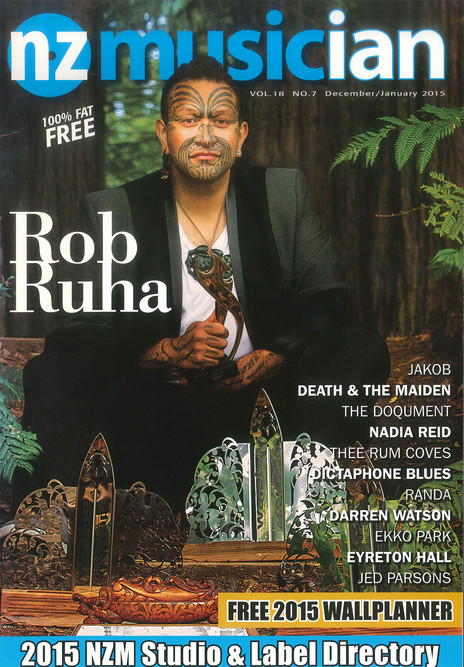
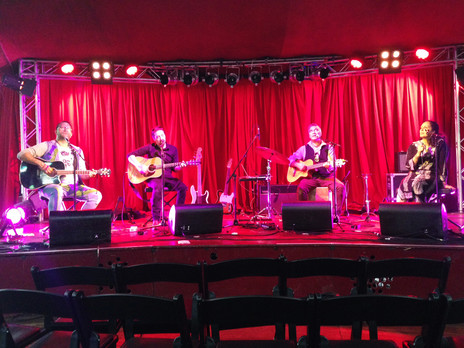
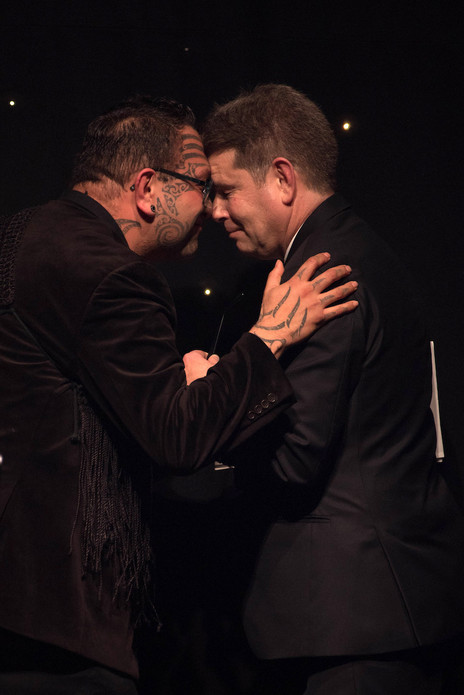
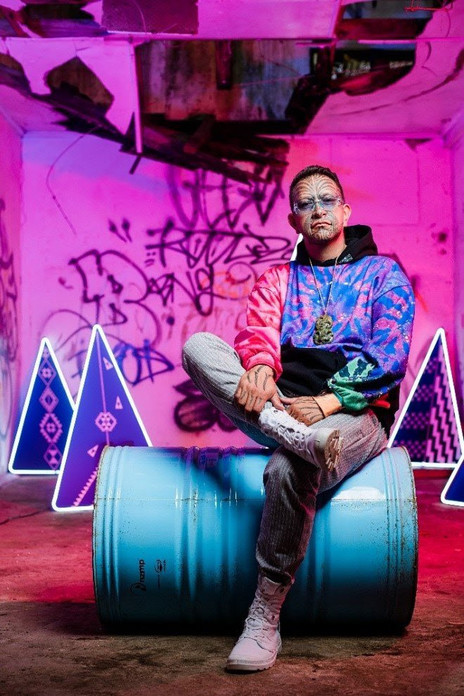
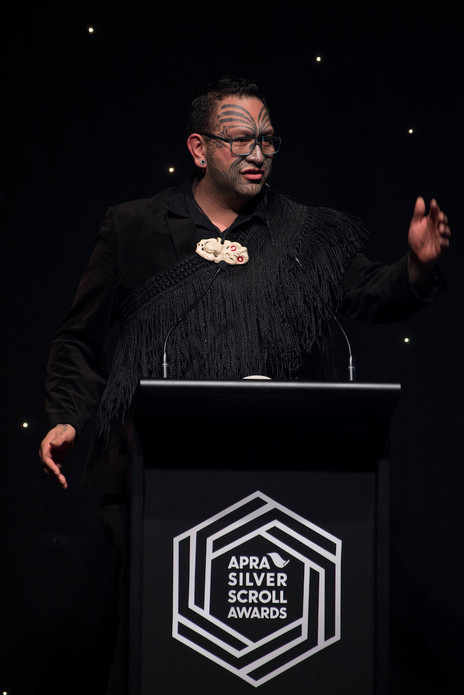
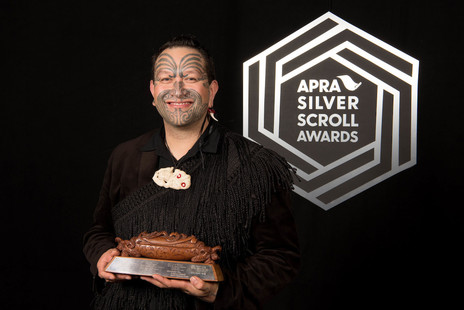
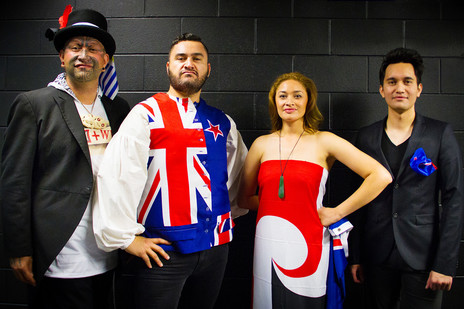
Rob Ruha Q&A in Stuff, June, 2022
Rob Ruha profile by Anton Blank, Stuff, January 2022
Visit our sister site
NZ On ScreenMade with funding from
NZ On Air







